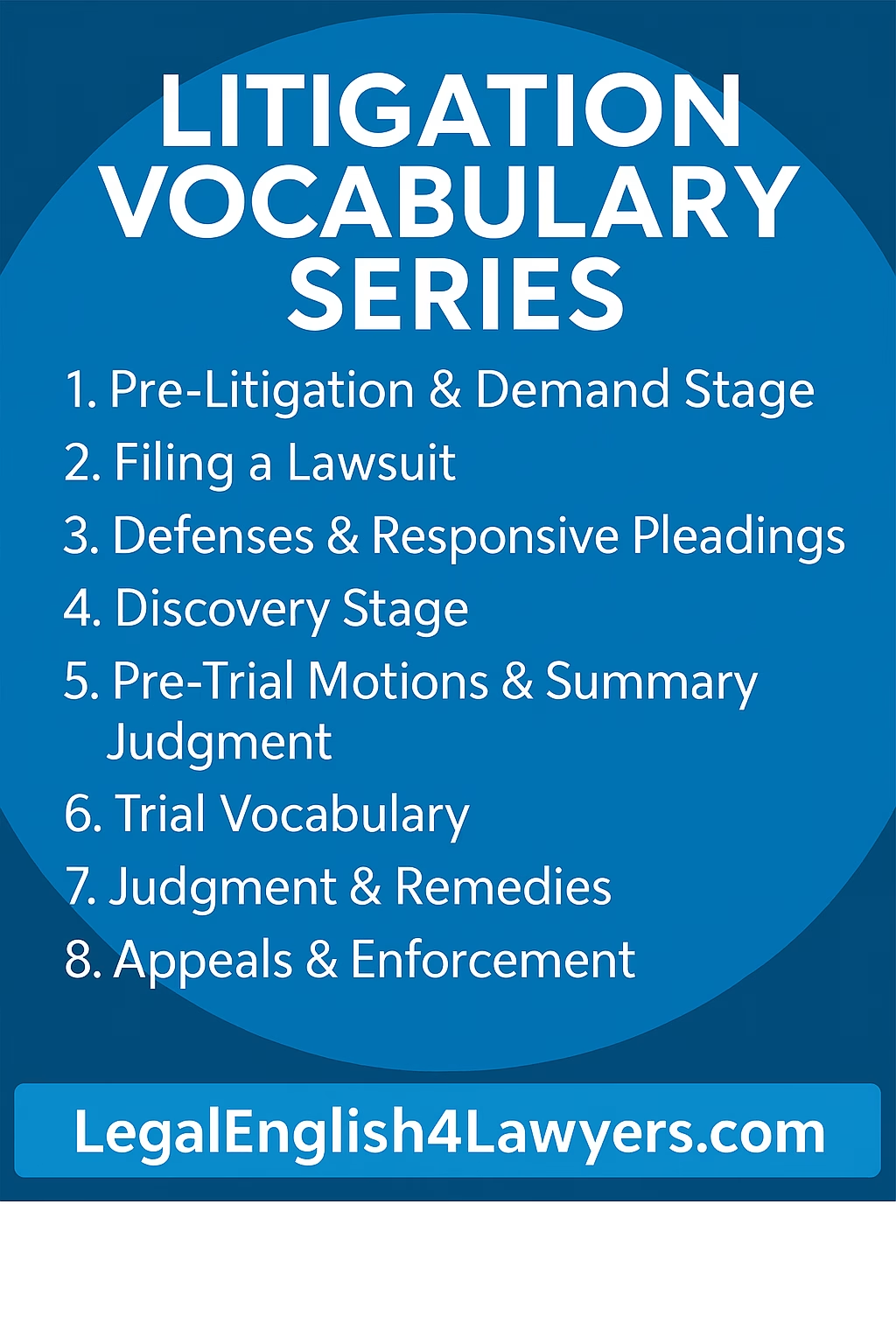
Introduction
Litigation doesn’t begin in the courtroom—it often starts long before a complaint is filed. The pre-litigation stage is a critical phase in which lawyers communicate through letters, notices, and negotiations to resolve disputes or lay the groundwork for formal legal action.
For lawyers and law students working in international or cross-border matters, mastering the vocabulary used during this stage is essential. In this first installment of our Litigation Vocabulary Series, we’ll explore eight essential Legal English terms used before a lawsuit ever reaches the court.
Litigation Vocabulary
1. Demand Letter
Definition:
A formal letter requesting that the recipient take or refrain from a specific action, usually to avoid litigation.
Example Sentence:
The company received a demand letter requesting immediate payment for unpaid services.
Sample Legal Clause:
“This letter serves as a formal demand for payment in the amount of $25,000 pursuant to Section 4.1 of the Agreement.”
Legal Context:
Demand letters are often the first legal document exchanged in a dispute. They’re used to assert a legal position, demand compliance, and open negotiations. In many cases, a demand letter is required before initiating litigation, especially in insurance claims, employment disputes, and consumer protection cases.
2. Notice of Breach
Definition:
A written communication informing a party that they have violated a contractual obligation.
Example Sentence:
The landlord issued a notice of breach after repeated failures by the tenant to pay rent on time.
Sample Legal Clause:
“This notice is provided pursuant to Section 8.2 and constitutes formal notice of breach.”
Legal Context:
Many contracts require that one party provide a notice of breach before terminating the agreement or seeking remedies. This document triggers legal timelines and is often essential to preserving future claims.
3. Reservation of Rights
Definition:
A statement made by a party that it is taking certain actions without waiving any legal rights.
Example Sentence:
The insurance company agreed to begin paying expenses under a full reservation of rights.
Sample Legal Clause:
“Client reserves all rights and defenses available under applicable law and contract.”
Legal Context:
Often used in responses to demands or complaints, a reservation of rights ensures that a party can participate in negotiations or fulfill partial obligations without being seen as admitting liability or waiving defenses.
4. Without Prejudice
Definition:
A phrase indicating that statements or offers cannot be used as evidence in court.
Example Sentence:
The parties exchanged several settlement proposals marked “without prejudice.”
Sample Legal Clause:
“This communication is made strictly without prejudice to our client’s rights and positions.”
Legal Context:
Using “without prejudice” allows lawyers to engage in candid negotiations while protecting their legal standing. It is a common feature of settlement discussions and pre-suit correspondence.
5. Good Faith Negotiation
Definition:
Efforts by parties to negotiate honestly and sincerely with the intent of reaching a resolution.
Example Sentence:
The parties agreed to attempt good faith negotiation before initiating litigation.
Sample Legal Clause:
“Both parties shall engage in good faith negotiation for a period of 30 days prior to filing suit.”
Legal Context:
Many contracts and legal frameworks require parties to negotiate in good faith before taking legal action. Failing to do so can be raised as a defense or procedural defect later in court or arbitration.
6. Cure Period
Definition:
A defined period of time during which a breaching party can correct or “cure” a violation.
Example Sentence:
The agreement included a 10-day cure period for any default in payment.
Sample Legal Clause:
“The breaching party shall have ten (10) days from receipt of notice to cure such breach.”
Legal Context:
Cure periods protect business relationships and minimize unnecessary litigation by allowing a party to fix problems before the other party escalates the dispute. Failure to provide or honor a cure period can sometimes invalidate a termination or claim.
7. Cease and Desist Letter
Definition:
A formal letter demanding that a party stop engaging in specific conduct, often related to intellectual property or contract violations.
Example Sentence:
A cease and desist letter was sent to the distributor accused of unauthorized use of the brand’s trademark.
Sample Legal Clause:
“You are hereby ordered to cease and desist from all further use of the protected material.”
Legal Context:
Common in IP disputes, defamation cases, and unfair competition, cease and desist letters are pre-litigation tools used to assert rights and often signal the beginning of a legal dispute.
8. Mitigation of Damages
Definition:
A legal principle requiring a harmed party to take reasonable steps to reduce or minimize their losses.
Example Sentence:
Despite the breach, the non-breaching party failed to mitigate damages by seeking a replacement supplier.
Sample Legal Clause:
“The non-breaching party shall use commercially reasonable efforts to mitigate its damages.”
Legal Context:
Parties who suffer a breach must show they tried to minimize losses. This concept often arises during pre-litigation correspondence to argue that damages are limited due to the injured party’s inaction.
Conclusion
The pre-litigation stage requires precision in both strategy and language. These eight terms form the foundation of effective legal communication before any documents are filed in court. Whether you’re drafting a demand letter, negotiating settlement, or preserving your client’s rights, understanding this vocabulary will help you communicate clearly, assertively, and professionally.
Gain Fluency In Legal English With Personalized Tutoring
At LegalEnglish4Lawyers.com, we don’t just define legal terms — we explore them through real documents, client scenarios, and clause-by-clause analysis.
DISCLAIMER
The content provided herein is only for discussion purposes and may contain errors. The reader is responsible to confirm the accuracy of the information provided. The content does not constitute legal or professional advice. We disclaim any liability for any loss or damage incurred directly or indirectly from the use of this information.

